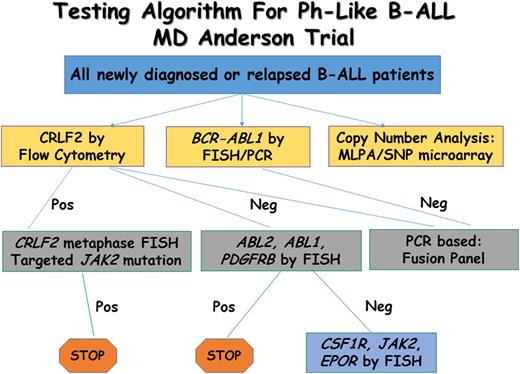Abstract
Introduction:
Philadelphia chromosome-like (Ph-like) B acute lymphoblastic leukemia (B-ALL) is characterized by a specific gene expression profile similar to that of Ph positive B-ALL, but lacks the BCR-ABL1 fusion. Ph-like B-ALL is known to frequently carry translocations and/or point mutations in various kinases and/or the cytokine receptor CRLF2 that activate a multi-kinase cascade and is often associated with poorer clinical outcomes. Recent reports have shown that patients with Ph-like B-ALLs respond to ABL1 or JAK2 inhibitors. However, timely diagnosis of Ph-like B-ALL cases remains clinically challenging.
Methods:
A panel of seven fluorescence in situ hybridization (FISH) probes targeting CRLF2, ABL1, ABL2, JAK2, PDGFRB, CSF1R and EPOR were designed and validated for the detection of rearrangements in Ph-like B-ALL. Of these, FISH for CRLF2was performed on both metaphase and interphase cells and the results were correlated with levels of CRLF2 expression assessed by multiparameter flow cytometry (MFC). Additional comprehensive analysis of fusion transcripts was conducted by PCR based testing. DNA copy number analyses were assessed using SNP microarray and/or MLPA and technologies.
Results:
For the initial validation, CRLF2 FISH was tested in 10 relapsed and 5 de novo B-ALL cases with CRLF2 overexpression by MFC and 100% concordance was achieved. FISH validation of other probes was successful in detecting known positive rearrangements. Using this panel, we tested a cohort of 57 B-ALL cases with a median age of 31 years old (range 13-81) and unknown Ph-like status, including 14 relapsed and 43 de novo. CRLF2 FISH was positive in all 17 (29.8%) MFC CRLF2 positive cases including 3 co-existing with the BCR-ABL1 fusion, showing 100% concordance. Of the 17 CRLF2 positive cases, five of nine cases tested (55.6%) were positive for JAK2 mutation. IGH-CRLF2 fusion was the most prevalent seen in 10 (58.9%) by metaphase FISH whereas P2RY8-CRLF2 was seen in two (11.8%) cases by metaphase FISH and/or SNP array analysis. One case had a novel fusion PAX5/ZCCHC7-CRLF2 detected by metaphase FISH analysis and the remaining 4 cases showed unknown fusion partners. In 40 (70.2%) CRLF2 negativecases, five (5/57, 8.8%) were positive with our FISH panel including two with CSF1R/PDGFRB, one with JAK2 and one with EPOR rearrangements, while one with NUP214-ABL1fusion was detected by PCR.
Conclusions:
Using the integrated MFC, FISH and Molecular testing, we demonstrated Ph-like B-ALL in 38.6% (22/57) of unselected B-ALL cases, including 17 CRLF2, 2 CSF1R/PDGFRB, 1 JAK2, 1 EPOR and 1 ABL1 rearrangements. Based on our clinical experience, we further implemented a clinical testing algorithm (Figure 1) for the diagnosis of Ph-like B-ALL. It is noteworthy that BCR-ABL1 fusion and CRLF2 rearrangement are not mutually exclusive and all B-ALL patients should be screened for both rearrangements simultaneously.
Mullighan:Incyte: Membership on an entity's Board of Directors or advisory committees; Amgen: Speakers Bureau; Loxo Oncology: Research Funding. Konopleva:Reata Pharmaceuticals: Equity Ownership; Abbvie: Consultancy, Research Funding; Genentech: Consultancy, Research Funding; Stemline: Consultancy, Research Funding; Eli Lilly: Research Funding; Cellectis: Research Funding; Calithera: Research Funding. Jain:Servier: Consultancy, Honoraria; BMS: Research Funding; Pfizer: Consultancy, Honoraria, Research Funding; Celgene: Research Funding; Abbvie: Research Funding; Seattle Genetics: Research Funding; Genentech: Research Funding; Infinity: Research Funding; Novartis: Consultancy, Honoraria; Novimmune: Consultancy, Honoraria; ADC Therapeutics: Consultancy, Honoraria, Research Funding; Incyte: Research Funding; Pharmacyclics: Consultancy, Honoraria, Research Funding.
Author notes
Asterisk with author names denotes non-ASH members.


This feature is available to Subscribers Only
Sign In or Create an Account Close Modal